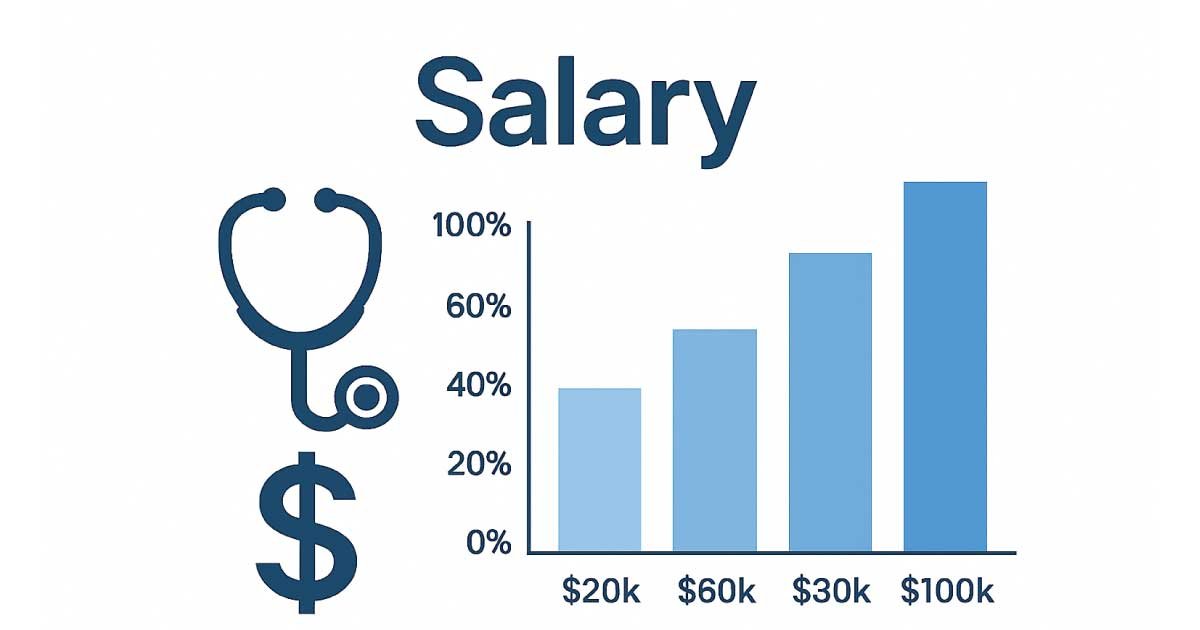Are you considering a career as a diagnostic medical sonographer? Or are you already in the field and curious about how much you can earn as your experience grows? In this in-depth guide, we will break down everything you need to know about the diagnostic sonographer salary in 2025, including monthly pay, hourly rates, experience-based income, and regional differences.
What Is a Diagnostic Medical Sonographer?
A diagnostic medical sonographer is a trained healthcare professional who uses ultrasound equipment to capture images of the body’s organs, tissues, and blood flow. These images help physicians make important diagnoses for various medical conditions. Sonographers don’t just press a button, they must know anatomy, understand how to operate sophisticated imaging tools, and interact with patients empathetically. They play a crucial role in identifying abnormalities in real-time and often work side by side with radiologists, obstetricians, or cardiologists. Specializations in this field include vascular, cardiac, abdominal, and obstetric sonography.
This career is ideal for individuals who enjoy working in healthcare but prefer a less invasive, more tech-oriented role. It’s a job that blends compassion, precision, and technology and that combination is highly valued in today’s medical environment.
How Much Does a Diagnostic Sonographer Make?
The diagnostic sonographer salary varies widely due to several influencing factors like education level, job location, and work environment. In 2025, the average annual salary in the United States ranges from $63,000 to $94,000, with national averages hovering around $79,000 per year. This is significantly higher than many other allied health professions, making it a smart financial choice.
Hospitals, private clinics, and diagnostic labs may all offer different pay scales. Those working in specialty hospitals or private diagnostic imaging centers usually earn more due to the complexity of the procedures and the pace of the work. Additional certifications also lead to better compensation.
Diagnostic Medical Sonographer Average Salary in 2025
Understanding the average pay gives insight into what most professionals in the field can expect. Here’s the breakdown:
- Annual Salary: $79,000
- Monthly Salary: $6,583
- Hourly Rate: $38/hour
This average reflects full-time positions with standard workloads. Keep in mind that bonuses, overtime, and weekend or night shifts can significantly boost your annual income.
Diagnostic Sonographer Salary Based on Experience
Experience is one of the most significant factors influencing pay. As you gain more years on the job, your salary grows accordingly. Here’s a breakdown:
| Experience Level | Hourly Rate (USD) | Monthly Salary (USD) | Annual Salary (USD) |
|---|---|---|---|
| Entry-Level (0-1 year) | $28 – $33 | $4,500 – $5,200 | $54,000 – $62,000 |
| Mid-Level (2-5 years) | $34 – $40 | $5,300 – $6,500 | $63,000 – $78,000 |
| Experienced (6-10 years) | $41 – $48 | $6,600 – $7,800 | $79,000 – $94,000 |
| Senior (10+ years) | $49 – $60 | $7,900 – $9,500 | $95,000 – $115,000 |
This chart illustrates that growth in salary is closely tied to skill mastery and professional development. Taking on leadership roles or mentoring new staff can also enhance your value within a hospital or clinic.
Diagnostic Sonographer Salary per Hour
If you are someone who likes flexibility, then understanding the diagnostic sonographer salary per hour is essential. Most professionals earn between $28 and $60 per hour depending on experience, certifications, and the type of facility.
Hourly wages are especially relevant for part-time workers or travel sonographers. High hourly rates are common in emergency situations or when staffing shortages occur. Hospitals often pay more for night shifts or weekend duties, allowing sonographers to maximize their income through flexible scheduling.
Entry-Level Diagnostic Sonographer Salary
Fresh graduates entering the workforce can expect a salary between $54,000 and $62,000 annually. Although this may be lower compared to experienced professionals, it’s still very competitive for a role that typically requires a two-year associate degree.
New sonographers often begin in general diagnostic imaging and later branch into specializations. With ongoing education and on-the-job experience, salary potential increases fairly quickly within the first five years.
Senior Diagnostic Sonographer Salary
Seasoned professionals with 10+ years in the field can earn up to $115,000 annually. Many in this tier have moved into roles such as lead technologist, clinical educator, or department manager.
A senior diagnostic sonographer salary not only reflects their technical proficiency but also their ability to train junior staff and contribute to workflow improvements in imaging departments. This experience also opens doors to administrative roles or teaching opportunities in sonography programs.
Diagnostic Sonographer Salary by State
Salaries can vary significantly across the United States. High-demand states with a higher cost of living typically offer higher wages to attract skilled professionals.
- California: $95,000/year average
- New York: $90,000/year average
- Texas: $80,000/year average
- Florida: $76,000/year average
- Ohio: $73,000/year average
Rural areas may offer relocation bonuses or housing stipends to encourage professionals to work in underserved regions. If you’re willing to move, you could boost your earnings significantly.
Highest Paying Cities for Diagnostic Sonographers
For those considering relocation or travel work, these cities offer top pay:
- San Francisco, CA – $110,000/year
- New York City, NY – $102,000/year
- Seattle, WA – $98,000/year
- Boston, MA – $96,000/year
These cities typically have a higher cost of living, but also more job opportunities and access to advanced medical facilities. If you are career-driven and seeking a challenge, these metros are excellent choices.
Travel Diagnostic Sonographer Salary
Travel sonographers are in high demand due to staffing shortages across the country. These professionals often work with agencies and take short-term assignments in hospitals and clinics.
A travel diagnostic sonographer salary can reach up to $60–$70/hour, especially in critical care facilities or rural locations. Additionally, many agencies cover travel, lodging, and provide bonuses, making this path financially and personally rewarding.
Part-Time Diagnostic Sonographer Pay
Not everyone wants to work full time, and part time roles are a great way to earn a decent income while enjoying work-life balance. Part-time diagnostic sonographer pay ranges from $30 to $45/hour, and often includes benefits like retirement contributions and flexible scheduling.
Part-time work is common among students, parents, and semi-retired professionals who still want to stay active in the field without a full-time commitment.
Ultrasound Technician Salary vs Diagnostic Sonographer
While these terms are often used interchangeably, there are distinctions. Ultrasound technicians typically perform basic imaging procedures, whereas diagnostic sonographers undergo more advanced training and may specialize in different areas.
- Ultrasound technician salary: $50,000–$70,000/year
- Diagnostic sonographer salary: $63,000–$115,000/year
The higher salary for diagnostic sonographers reflects their broader scope of practice and advanced expertise. If you’re already an ultrasound technician, additional certification can help you transition into sonography and boost your pay.
Diagnostic Sonographer Job Outlook and Pay
The job market for diagnostic sonographers is bright. According to the U.S. Bureau of Labor Statistics, employment in this field is expected to grow by 10% through 2030, much faster than the average for all occupations.
As healthcare facilities continue to expand and aging populations need more diagnostic services, demand for skilled sonographers will only rise. That makes the diagnostic sonographer job outlook and pay very appealing for both new graduates and career switchers.
Diagnostic Sonographer Pay Scale 2025
To sum it up, here’s a snapshot of the diagnostic sonographer pay scale in 2025:
- Entry-level: $54,000/year
- Average (mid-level): $79,000/year
- Experienced: $94,000/year
- Senior (10+ years): $115,000/year
- Hourly Rate Range: $28–$60/hour
Knowing where you fall on this scale can help you negotiate better pay, plan your career, and set goals for further training and specialization.
Final Thoughts: Is Sonography a Good Career in 2025?
Yes—without a doubt. Becoming a diagnostic medical sonographer offers you the chance to work in a dynamic healthcare setting, make a difference in people’s lives, and earn a strong income. The monthly salaries, attractive hourly rates, and clear experience-based pay scale make this a highly desirable profession.
Whether you are just getting started or already in the field, staying updated on salary trends, certifications, and job opportunities is key. With the growing demand in diagnostic imaging, this is a career that offers both stability and opportunity.
Bonus Tip:
Boost your earnings and career progression by investing in accredited sonography programs or exploring online diagnostic sonographer degree options. Keep up with the latest ultrasound machines for hospitals and consider obtaining multiple certifications to become a top-tier professional in the field.
Stay informed, stay skilled, and enjoy the journey toward a successful and financially rewarding diagnostic sonography career and beyond!
Check out this latest and comprehensive guide we have prepared for you:
FAQs:
How much does a diagnostic sonographer make a year?
A diagnostic sonographer earns between $60,000 and $100,000 per year, depending on their experience, location, and specialty. Beginners usually start at the lower end, while seasoned professionals or those working in high-demand areas like California can make six figures. Salary also increases with certifications and if you’re working in a hospital versus a clinic.
What is the hourly rate for a diagnostic medical sonographer?
The average hourly rate for a diagnostic medical sonographer in the U.S. is around $30 to $45 per hour. Entry-level sonographers might earn closer to $28, while experienced professionals can go beyond $45 per hour. Overtime, night shifts, and weekend shifts often pay higher. Rates also vary based on the facility and location.
Do diagnostic sonographers make good money?
Yes, diagnostic sonographers are considered well-paid, especially when compared to the amount of education required. With just a two-year associate degree, many can earn $70,000+ annually. The job also offers great benefits, flexible hours, and high demand in hospitals and private practices, making it a financially rewarding and stable healthcare career.
What factors affect a diagnostic sonographer’s salary?
A sonographer’s salary depends on experience, education level, certifications, location, and work setting. Urban hospitals usually pay more than rural clinics. Specializing in high-demand areas like cardiac or vascular sonography can also boost pay. Extra certifications and years in the field significantly increase earning potential over time.
Is being a diagnostic sonographer worth it?
Absolutely. Becoming a diagnostic sonographer offers high pay, job stability, and the chance to help others, all with relatively low educational debt. Most programs take 2–4 years, and you can start earning quickly. It’s a hands-on, respected profession with room for growth and specialization, making it a smart long-term career choice.
Which states pay diagnostic sonographers the most?
States like California, Washington, Oregon, and Massachusetts often pay diagnostic sonographers the highest salaries, with averages reaching $90,000 or more per year. High demand, cost of living, and population density in these areas drive up wages. In contrast, southern states may offer lower salaries but often have a lower cost of living.
Does experience increase a sonographer’s salary?
Yes, experience plays a big role in salary growth. A diagnostic sonographer with 5+ years of experience can earn $10,000 to $20,000 more per year than a new graduate. Senior sonographers often take on specialized roles or supervisory positions, further increasing their income. Staying updated with certifications also helps maximize earnings over time.
Are diagnostic sonographers in high demand?
Yes, diagnostic sonographers are in very high demand across the U.S. The aging population and growth in non-invasive medical testing have created more job openings. According to the U.S. Bureau of Labor Statistics, employment is expected to grow 10% or more through 2032, which is much faster than the average for most jobs.
Disclaimer: This content is based on publicly available information and industry data. Salary estimates are approximate and may vary depending on experience, location, and job role. This article is for informational purposes only and does not constitute financial, career, or legal advice.

